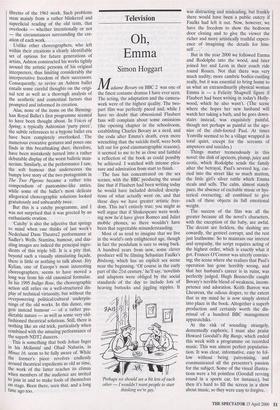Television
Oh, Emma
Simon Hoggart
adame Bovary on BBC 2 was one of the finest costume dramas I have ever seen. The acting, the adaptation and the camera- work were of the highest quality. The two- part film was perfectly paced and, while I have no doubt that obsessional Flaubert fans will complain about some omissions (the opening chapter in the schoolroom, establishing Charles Bovary as a nerd, and the coda after Emma's death, even more wrenching than the suicide itself, were both left out for good cinematographic reasons), it seemed to me to be as close and faithful a reflection of the book as could possibly be achieved. I watched with intense plea- sure and admiration from start to finish.
The fuss has concentrated on the sex scenes, with the BBC producing the usual line that if Flaubert had been writing today he would have included detailed descrip- tions of what actually went on, and that these days we have greater artistic free- dom. This isn't entirely true; you might as well argue that if Shakespeare were work- ing now he'd have given Romeo and Juliet mobile phones, so there wouldn't have been that regrettable misunderstanding.
Most of us tend to imagine that we live in the world's only enlightened age, though in fact the pendulum is sure to swing back. A hundred years from now, some clever producer will be filming Sebastian Faulks's Birdsong, which has an explicit sex scene near the beginning. 'Of course in the early part of the 21st century,' he'll say, 'novelists and adaptors were obliged by the social standards of the day to include lots of heaving buttocks and jiggling nipples. It
'Perhaps we should see a bit less of each other — 1 wouldn't want people to start thinking we're gay.' was distracting and misleading, but frankly there would have been a public outcry if Faulks had left it out. Now, however, we have the freedom to show the bedroom door closing and to give the viewer the richer and more artistically truthful experi- ence of imagining the details for him- self ... '
But in the year 2000 we followed Emma and Rodolphe into the wood, and later joined her and Leon in their coach ride round Rouen. Not that there was very much nudity; more cambric bodice-rustling really, but it was essential to bring home to us what an extraordinarily physical woman Emma is — a Felicity Shagwell figure if Flaubert had been writing in today's Holly- wood, which he also wasn't. (The scene where she hopes her new husband will watch her taking a bath, and he goes down- stairs instead, was exquisitely painful, though not perhaps as painful as the ago- nies of the club-footed Paul. At times Yonville seemed to be a village wrapped in total quiet, except for the screams of amputees and suicides.) Things matter tremendously in this novel: the dish of apricots, plump, juicy and erotic, which Rodolphe sends the family after the betrayal, Paul's severed leg, car- ried into the street like so much mutton, the little girl's silver rattle which Emma steals and sells. The calm, almost stately pace, the absence of excitable music or hys- terical overacting, all combined to give each of these objects its full emotional weight.
The success of the film was all the greater because all the novel's characters, with the exception of the baby, are awful. The decent are feckless, the dashing are cowardly, the genteel corrupt, and the rest just loathsome. So to maintain our interest and sympathy, the script requires acting of the highest order, which is exactly what it got. Frances O'Connor was utterly convinc- ing; the scene where she realises that Paul's operation has gone horribly wrong, and that her husband's career is in ruins, was perfectly judged. Hugh Bonneville caught Bovary's terrible blend of weakness, incom- petence and adoration. Keith Barron was Lheureux, the odious draper, to the extent that in my mind he is now simply slotted into place in the book. Altogether a superb production and certainly worth the dis- missal of a hundred BBC management apparatchiks.
At the risk of sounding strangely, dementedly euphoric, I must also praise Howard Goodall's Big Bangs, which ended this week with a programme on recorded music. This was almost perfect popularisa- tion. It was clear, informative, easy to fol- low without being patronising, and communicated all the presenter's passion for the subject. Some of the visual illustra- tions were a bit pointless (Goodall revving round in a sports car, for instance), but then it's hard to fill the screen in a show about music, so they were easy to forgive.


































































 Previous page
Previous page